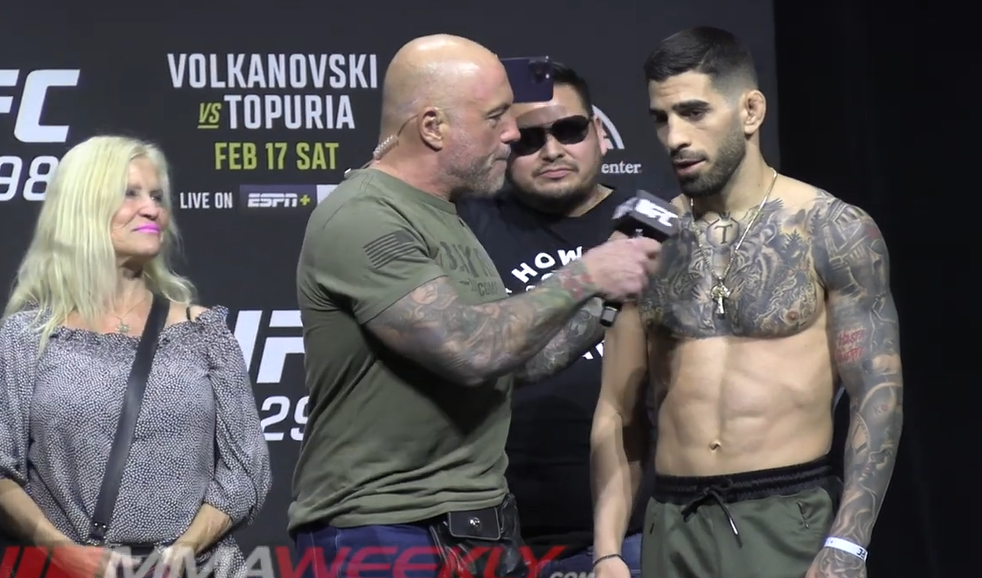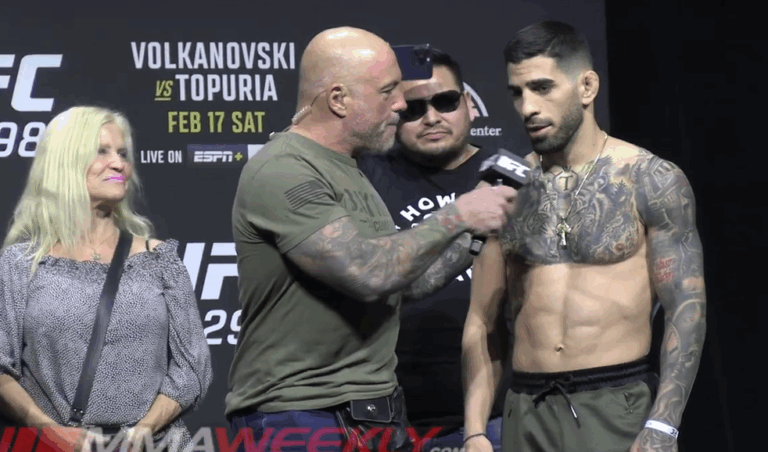Ilia Topuria’s switch from featherweight to lightweight was a strategic redefining of his career path, not merely a tactical one. When moving up the weight classes, many fighters falter, but Topuria not only accepted the change, he overcame it. He weighed 155 pounds, so he didn’t look out of place at all. In fact, he appeared especially at ease—even dangerous—in a division that is notorious for its fierce rivalry.
The topic of weight class adjustments has gained more attention in recent years, particularly as fighters have realized the negative effects of drastically reducing their weight on their bodies and minds. Given that Topuria’s natural walking weight was approximately 185 pounds, dropping to featherweight was not only challenging but also possibly dangerous. When he was pulled from UFC 270 because of weight-cut issues, that risk was made abundantly clear.
Ilia Topuria Bio and Career Overview
| Attribute | Detail |
|---|---|
| Full Name | Ilia Topuria |
| Nickname | El Matador |
| Date of Birth | January 21, 1997 |
| Birthplace | Halle, Germany |
| Nationality | Georgian, Spanish |
| Height | 5 ft 7 in (170 cm) |
| Weight Class | Lightweight (current), Featherweight (former) |
| Weight | 155 lbs (70 kg) |
| Reach | 69 inches (175 cm) |
| Fighting Style | Brazilian Jiu-Jitsu, Boxing |
| UFC Titles | UFC Lightweight Champion, Former UFC Featherweight Champion |
| Record | 17 Wins, 0 Losses |
| Fighting Out Of | Alicante, Spain |
| Major Wins | Volkanovski, Holloway, Oliveira |
| Team | Topuria Team (formerly Climent Club) |
| Website | https://en.wikipedia.org/wiki/Ilia_Topuria |

By switching to lightweight, Topuria maintained his explosive power while also greatly lessening the physical strain on his body. Since switching, he has given incredibly powerful performances. At UFC 317, his first-round knockout of Charles Oliveira was more than just a victory; it was a declaration. He quickly defeated one of the UFC’s most dangerous former champions after entering one of the sport’s most competitive divisions.
Topuria made the transition to lightweight appear smooth and incredibly effective through careful planning and honed conditioning. Mexican greats like Canelo Álvarez have inspired his sharp, disciplined boxing, which has helped him improve his stand-up game in recent years. His footwork, shoulder-roll defense, and ability to precisely cut angles and counter are all blatant examples of that influence. Against opponents such as Max Holloway and Josh Emmett, those tools proved to be decisive advantages.
His change is similar to previous instances of fighters who were able to advance their careers by switching divisions. Similar to Conor McGregor’s historic two-belt reign or Georges St-Pierre’s transition to middleweight, Topuria’s move was well-timed and especially advantageous. It was an act of ambition supported by readiness rather than desperation. Topuria is now the dominant force in the lightweight class, which was previously dominated by athletes like Islam Makhachev and Justin Gaethje. This is due to his versatility and undefeated aura in addition to his skill set.
After a successful run at featherweight, where he defeated Volkanovski and gave Max Holloway his first career knockout loss, he was promoted. He decided to give up the title rather than wait for a rematch or another defense. Despite being unexpected, that choice showed a forward-thinking attitude—one that supports the notion of constantly pushing oneself instead of remaining in one’s comfort zone.
Dana White, the president of the UFC, openly acknowledged that Topuria’s motivations went beyond his health. He believed there were not enough new challenges in the featherweight scene. He desired more substantial legacy opportunities, more formidable opponents, and more difficult battles. After just one fight at lightweight, that mentality has already paid off, as he now holds the top spot in the pound-for-pound rankings.
Ilia’s attitude toward mixed martial arts also reveals a stronger bond with his ancestry. His status as the first fighter from Georgia and Spain to win a UFC title has served as motivation for young athletes in both countries. A testament to his dual identity and the pride he brings to every fight, he was granted Spanish citizenship in March 2024 and the Georgian Order of Honor later that same month. His accomplishments have greatly raised awareness of MMA talent in Georgia and Spain.
His ability to stay grounded in the face of quick success is what makes him unique among fighters. He speaks multiple languages, values his family, and freely expresses his Christian beliefs. He adds a distinctively human element to a sport that is frequently dominated by statistics and trash talk by embracing his cultural heritage while honing his identity in the Octagon. He speaks modestly during interviews, but he isn’t afraid to show confidence. His execution has been faultless, and he has a very strong belief in his abilities.
Topuria has also contributed to changing the way fighters approach weight classes through strategic alliances and career choices. He is now a role model for athletes who are reevaluating the expense of drastic cuts. He has demonstrated that success doesn’t have to come at the expense of wellbeing by letting his body flourish at its optimal level and balancing that physical well-being with technical prowess.
Given his strength, tenacity, and sharp fighting intelligence, there is increasing conjecture regarding whether he will eventually attempt to move up to welterweight. Lightweight, however, is his for the time being. With each performance, a more polished, self-assured, and devastating version of him has emerged. This type of development is especially creative and shows a fighter who is influencing the sport rather than merely responding to it.


